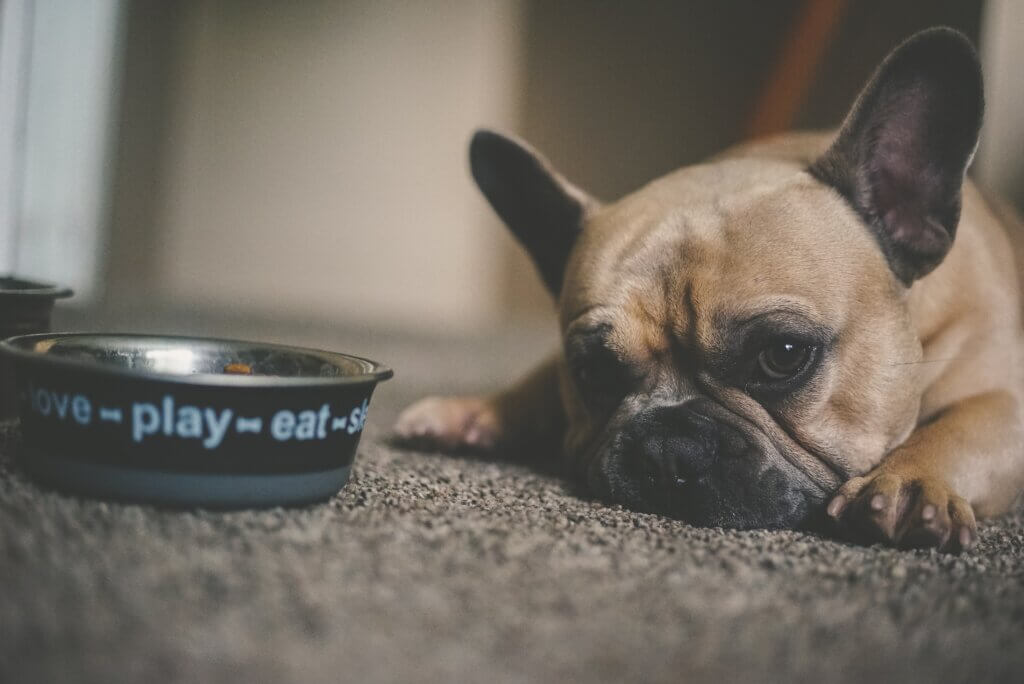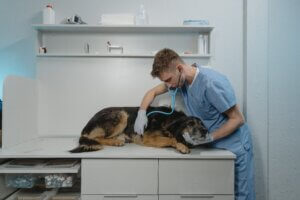What You Need to Know About Stress Diarrhea in Dogs

It’s common for humans to have an upset stomach because of stress, but what you may not know is that stress diarrhea in dogs is also common.
Dogs get stressed just like we do.
Similarly, stress can cause changes to dogs’ gut bacteria, resulting in diarrhea.
VCA Animal Hospitals explains, “Colitis simply refers to inflammation of the large intestine (colon). Colitis is most commonly used to describe diarrhea or loose stools associated with the large bowel. Large bowel diarrhea is another term for colitis.”
While it can be upsetting to see your dog have diarrhea and make a mess in your home, it’s important to know that it tends to be short-lived.
According to MetLife Pet Insurance, “Acute colitis in dogs is short-lived. It usually resolves on its own after a few days. Stress-induced colitis in dogs is the most common cause of acute colitis.”
Even so, you should ignore it if your dog is showing symptoms of colitis.
Read on to learn how to recognize, treat, and prevent stress diarrhea in dogs.
What are the Signs of Stress Colitis?
The most obvious sign that your dog is suffering from stress colitis is loose stools.
Additionally, be on the lookout for the following symptoms.
- Straining when pooping
- Pooping more frequently
- Increased urgency to poop
- Mucous in the stool
- Small amounts of fresh (bright red) blood in the stool
What are the Causes of Stress Diarrhea in Dogs?
Colitis can be caused by numerous things, including intestinal worms and food allergies.
However, stress colitis is caused by stress – both good stress and bad stress.
Here is a list from Zoetis Pet Care:
- Emotional (Both Positive and Negative): Fear, anxiety, trauma, depression, changes in routine, and excitement from playtime, visitors, car rides, or new experiences
- Physical: Exercise, pain, injury, or trauma
- Environmental: Extreme temperatures, pollutants, or allergens
- Biological: Physical changes and discomfort from bacteria, fungi, viruses, or parasites
- Chemical: Physical changes and discomfort from toxins, herbicides, pesticides, or dust
- Dietary: High-fat foods, inconsistent diet, or difficult-to-digest foods
Again, think about what causes you good stress and bad stress. Your dog is likely stressed by the same types of things. This stress can cause an overgrowth of bad gut bacteria, leading to diarrhea.
How is Stress Colitis Diagnosed?
It’s important to remember that stress is not the only thing that can cause colitis in your dog. There are many other reasons your dog may have an upset stomach.
This is why it is important to have your dog properly diagnosed by a veterinarian.
Your veterinarian will examine your dog’s medical history, perform an exam, and do fecal testing to determine if your dog is suffering from stress colitis.
They may also have X-rays taken.
Your veterinarian will be trying to rule out parasites, tumors, polyps, and irritable bowel syndrome.
How is Stress Diarrhea in Dogs Treated?
How your dog is treated for stress colitis will largely depend on his unique symptoms.
For example, most dogs will simply need to fast for 24-48 hours and change their diet.
However, dogs who have had more extreme stress colitis may need to be hospitalized and given fluids intravenously.
Most likely, your dog will be prescribed a specific diet, such as plain chicken and white rice.
Your veterinarian may also recommend probiotics and adding fiber to your dog’s diet.
As a reminder, colitis typically does not last long, but it can be recurring, especially if triggered by stress.
NOTE – Do not try to treat your dog at home with anti-diarrheal medications made for humans. These can be toxic for dogs.
What are Some Ways to Prevent Stress Colitis?
If you’re like me, it may make you a little sad knowing your poor pup is so stressed that it is upsetting his tummy.
While we can’t 100% prevent stress colitis, there are things we can do to help it occur less often.
Here are some general tips for preventing stress diarrhea in dogs.
- Make sure your dog is fed a dog-safe diet.
- Avoid stressful situations when possible. If you know your dog is facing a stressful situation, such as traveling, give him a dog-safe calming supplement.
- Create a calming environment for your dog.
- Follow a regular routine.
- Don’t let your dog overexert himself.
- Work with a trainer to desensitize and condition your dog to manage different stressors.
We can’t treat stress colitis in dogs, but Super Scoopers strives to provide a stress-free experience for dogs and their owners. Sign up for safe poop scooping service today!




